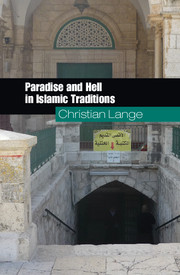Book contents
- Frontmatter
- Dedication
- Contents
- List of Figures
- List of Table and Charts
- Acknowledgements
- List of Abbreviations
- Note on Dates, Citation, Translations, and Transliteration
- Introduction
- Part I Textual Foundations: Narrating the Otherworld
- 1 The Otherworld Revealed: Paradise and Hell in the Qur'ān
- 2 The Growth of the Islamic Otherworld: A History of Muslim Traditionist Eschatology
- 3 Hope, Fear, and Entertainment: Parenetic and Popular Muslim Literature on the Otherworld
- 4 The Imagination Unbound: Two Late Medieval Muslim Scholars on Paradise and Hell
- Part II Discourses and Practices: Debating the Otherworld
- Epilogue
- Primary Sources
- Secondary Sources
- Index of Names
- Index of Terms
4 - The Imagination Unbound: Two Late Medieval Muslim Scholars on Paradise and Hell
from Part I - Textual Foundations: Narrating the Otherworld
Published online by Cambridge University Press: 05 December 2015
- Frontmatter
- Dedication
- Contents
- List of Figures
- List of Table and Charts
- Acknowledgements
- List of Abbreviations
- Note on Dates, Citation, Translations, and Transliteration
- Introduction
- Part I Textual Foundations: Narrating the Otherworld
- 1 The Otherworld Revealed: Paradise and Hell in the Qur'ān
- 2 The Growth of the Islamic Otherworld: A History of Muslim Traditionist Eschatology
- 3 Hope, Fear, and Entertainment: Parenetic and Popular Muslim Literature on the Otherworld
- 4 The Imagination Unbound: Two Late Medieval Muslim Scholars on Paradise and Hell
- Part II Discourses and Practices: Debating the Otherworld
- Epilogue
- Primary Sources
- Secondary Sources
- Index of Names
- Index of Terms
Summary
As we noted in previous chapters, the adage that the otherworld is filled with things “that no eye has seen, no ear has heard and no human mind has conceived” enjoys great prominence in Muslim eschatological literature. Nonetheless, there are myriad works of the traditionist kind, some impressively large, that purport to know a great deal about paradise and hell. This contradiction was facilitated by the agglutinative nature of traditionist literature. Eschatology being one of the most fertile fields for the religious imagination, numerous traditions (akhbār, sg. khabar) gradually came into circulation from the early centuries of Islam onwards. Given the low standards of admissibility especially for eschatological hadiths, collectors of khabars were relatively free in compiling the material. Gradually, but inexorably, traditions added up to more complex scenes, and scenes were combined into detailed tableaux. From this process emerged encyclopaedic works of eschatology that built on and developed “a canon [that] imagines the unimaginable.”
Chapters 1 through 3 of this book have traced the scriptural and textual history of the (Sunni) Muslim imagery of paradise and hell. Building on this foundation, this chapter offers a broad panoply of the Muslim paradise and hell, outlining the topography of both realms and providing an inventory of their contents. Two Late Medieval compilations of eschatological hadith will serve as our main witnesses, the Shining Full Moons of Eschatology (al-Budūr al-sāfira fī ʿulūm al-ākhira) of the Sunni polymath al-Suyūṭī (Egypt, d. 911/1505), and the chapters on the otherworld contained in volumes six through eight of the Oceans of Lights (Biḥār al-anwār) of the Shiʿi traditionist and theologian al-Majlisī (Persia, d. 1110/1699). Both al-Suyūṭī and al-Majlisī are major contributors to the genre. As such, their biographies receive separate discussion in other chapters of this book. To complement these two sources, and to achieve a wider geographical spread, reference will also be made to the eschatological handbooks of the Sunni commentator and jurist al-Qurṭubī (al-Andalus/Egypt, d. 621/1273) and the Shiʿi traditionist and exegete Hāshim b. Sulaymān al-Baḥrānī (Bahrain, d. 1107/1695 or 6), two scholars whose biographies likewise receive greater attention elsewhere in this book. What will occupy us in the pages that follow is not the place of these compilers in the history of Muslim eschatological literature but the morphology of paradise and hell that emerges from a synchronic reading of their works.
- Type
- Chapter
- Information
- Paradise and Hell in Islamic Traditions , pp. 120 - 162Publisher: Cambridge University PressPrint publication year: 2015



